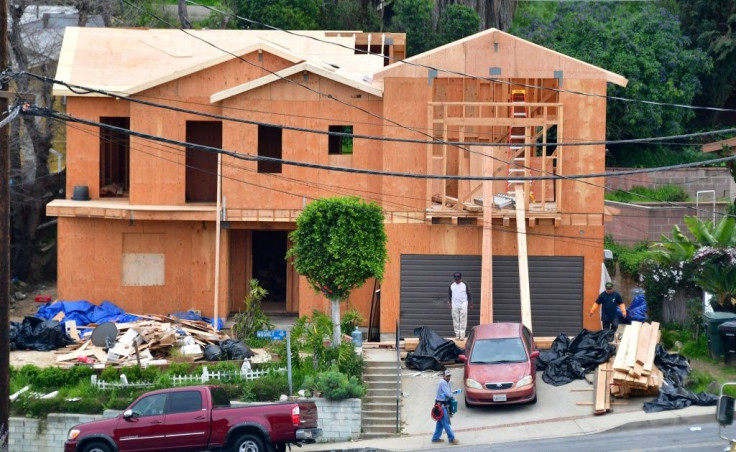Coronavirus Pandemic Decimating US Homebuilding Industry

KEY POINTS
- Housing starts plunged 22.3% plunge in in March -- the worst monthly decline since March 1984.
- March also witnessed a 6.8% decline in housing permits to 1.35 million
- NAHB revealed that homebuilder confidence plunged by 42 points in April
The catastrophic impact of the coronavirus-related shutdown on the U.S. homebuilding industry was underscored by a massive 22.3% plunge in housing starts in March -- the worst monthly decline since March 1984.
The Commerce Department said that groundbreakings amounted to a seasonally adjusted annual rate of 1.2 million units, down from a 1.56 million in February.
The construction of single-family houses dropped by 17.5%, while apartment and condominium starts plummeted by 32.1% from the prior month.
In addition, many homes have been left unfinished as illustrated by a 6.1% decline in the completion of homes being constructed. For single-family homes, this figure amounted to 15%.
March also witnessed a 6.8% decline in housing permits to 1.35 million, suggesting a continued slowdown in new construction.
"Unprecedented economic uncertainty and mandatory distancing guidelines squashed homebuyer demand and builders' ability to confidently invest in new housing projects," said Zillow economist Matthew Speakman.
Ian Shepherdson, chief economist at Pantheon Macroeconomics, wrote: "The unfolding nightmare in the labor market has removed large numbers of potential homebuyers from the pool.”
Robert Dietz, chief economist at National Association of Home Builders, or NAHB, said he expects further declines in home construction in April “due to the unprecedented decline in builder confidence in our latest member survey.”
“It is worth noting that there are currently 534,000 single-family homes currently under construction and 684,000 apartments,” Dietz added. “Approximately 90% of these single-family units are located in states where home building is deemed as an ‘essential service,’ while 80% of apartments are located in such states.”
“Essential” businesses can continue to operate even in jurisdictions with “stay-at-home” orders in place.
The boss of NAHB said if more states designated homebuilding as an essential business, the industry could help the national economy recover.
“Housing has been deemed an essential business in most of the nation, and in the few states where the governors have not acted, we urge them to deem construction as essential,” said Dean Mon, chairman of NAHB. “Housing can help lead an eventual rebound, as it has done in previous recessions.”
On Wednesday, NAHB revealed that homebuilder confidence plunged by 42 points in April to 30 -- the largest single monthly decline ever.
“This unprecedented drop in builder confidence is due exclusively to the coronavirus outbreak across the nation, as unemployment has skyrocketed and gaps in the supply chain have hampered construction activities,” said Chairman Mon. “Meanwhile, there continues to be some confusion over builder eligibility for the Paycheck Protection Program, as some builders have successfully submitted loan applications while others have not been able to. NAHB is working with the White House, Treasury and Congress to get the broadest builder participation possible.”
Dietz noted that prior to the pandemic, the U.S. housing market showed signs of strength in January and February.
“To show how hard and fast this [virus] outbreak has hit the housing sector, a recent poll of our members reveals that 96% reported that virus mitigation efforts were hurting buyer traffic,” he said. “While the virus is severely disrupting residential construction and the overall economy, the need and demand for housing remains acute.”
Ali Wolf, chief economist with the housing data and consulting firm Meyers Research, noted that even in active housing construction projects, social distancing rules will slow down completion times.
“This is starting to delay how long it takes to build a home,” Wolf said.
Jeff Caruso, CEO of Caruso Homes in Maryland, said his firm will allow no more than five workers outside a house and no more than three inside at any given time.
“We also have designated people in our company that are literally going job to job and making sure that everybody’s following these [social distancing] rules,” Caruso said.
Caruso estimated his company’s sales plunged about 80% so far this month – but partly because mortgage lenders have tightened credit standards.
Some analysts think the housing market may recover sooner than other sectors given low borrowing costs and supply limitations.
"I don't expect a collapse in [housing] prices," said David Kelly, chief global strategist at JPMorgan Asset Management. "There's no reasons to sell your home at a loss this year if you can get a better price next year."
Housing is an extremely important industry as it typically accounts for about 15% of U.S. economic growth.
© Copyright IBTimes 2025. All rights reserved.





















